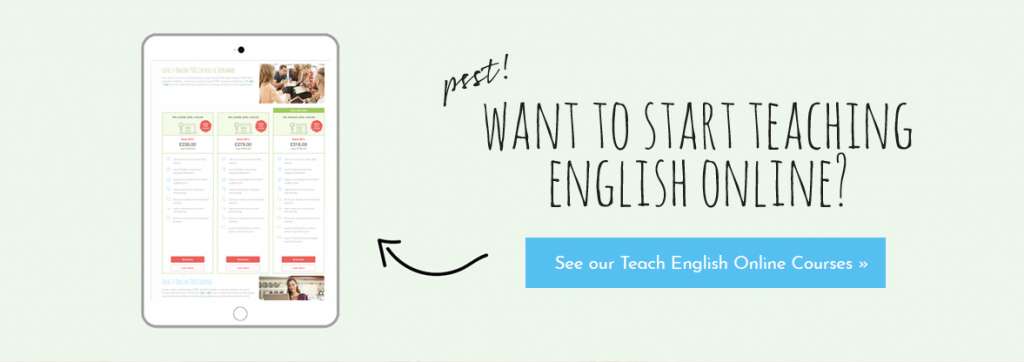Experienced online TEFL teacher and coach Tess has worked in education for 20 years and used to run her own ESL company in France. She is now an online TEFL teacher for Whales English and also one of their top recruiters, having helped over 80 teachers to join Whales in the past eight months. Tess went live on i-to-i’s Facebook page to share her tips, tricks and advice on how to land an online TEFL job. Watch the full webinar below or read on for edited extracts.
What qualifications are online TEFL companies looking for?
The majority of online TEFL schools require their teachers to have a 120-hour TEFL certificate. Without that, you are not going to go very far. If you are a fairly new teacher, I would advise you to do a longer TEFL course – Level 5 courses are always good.
For online TEFL companies such as VIPKid, iTutorGroup, ZebraEnglish, DaDa, SayABC, GoGoKid, QKids, Magic Ears, Whales English and Bling ABC you also need to have a degree, which can be in any subject. If you don’t have a degree, there are still some companies out there for you, including PalFish, Cambly, iTalki and Preply. Another avenue is to develop your own lessons and put them on Outschool.
Do I need teaching experience for online TEFL jobs?
You do need one year’s teaching experience for Whales English, VIPKid, ZebraEnglish and GoGoKid. Think about your experience. If you have home schooled, that counts as experience. Coaching can be teaching experience. Conversational English would work as experience. It is all in the wording: how can you sell yourself as an experienced teacher? It does not have to be online. I wasn’t an online teacher until I went to Whales. You learn fast.
If you don’t have teaching experience, look at companies such as DaDa, Magic Ears, QKids, PalFish and Cambly.
Are there any restrictions on nationality?
For VIPKid you need to be from the US, Canada and South Africa. GoGo Kid and QKids only hire native English speakers from the US and Canada. Magic Ears hire from the US and Canada plus South Africa and the UK (but they change their requirements, so do check their website). For Zebra you have to have a legal right to work in the US or Canada but you could potentially be any nationality if you have a neutral English accent.
Whales, DaDa, and iTutor Group all recruit from the US, Canada, UK, Australia, New Zealand and Ireland. DaDa and iTutorGroup also accept South African teachers and iTutorGroup hires non-native neutral English speakers.
Which TEFL companies hire South African teachers?
Cambly, DaDa, iTutor Group, and PalFish all hire South African teachers. VIPKid have just started hiring teachers from South Africa. Magic Ears sometimes recruit South Africans but their requirements change.
I recommend that you go onto Facebook and say, ‘I am a South African with a degree and TEFL certificate. I am looking to teach adults at South African hours,’ or something like that. That is a really good place to find out information.
Are there any other requirements?
For Whales English, you need a degree, you need one year’s experience teaching and you need to have a passport from the UK, Ireland, Australia, New Zealand, Canada or USA. If you have a British passport and you live anywhere in the world, including in South Africa, you can apply. It is the passport that is important.
There are some companies that are really specific about accents. Apparently, Zebra English is very concerned about having a neutral accent. I really suggest you do your research on the companies and dig deep. If you are interested in one of these companies, find yourself a good referrer. That is super important.
Are online TEFL companies hiring right now?
Online TEFL companies do sometimes have a pause but most are constantly hiring, if you meet all the requirements. Cambly has just started hiring again. Whales English is constantly growing.
What is the application process for online TEFL jobs?
Each school has their own process, so it’s important to do your research. Go onto Facebook groups and say, ‘I have got an interview for X company. Has anyone done this recently?’ The more you know, the better it will be.
Some companies will ask for a recorded video to sell your teaching skills. If that works, you get through to an interview. If you use me as a referrer for Whales English, I will ask you to send me your CV. When that is spot on, you will apply using my referral link. Whales English then has a look to make sure that you are a great candidate. If they think you are, you will be invited to interview.
At the interview, you will teach a mock class and have some questions, which tend to be around your CV: what you have done, your experience, something you have really enjoyed, a good example of teaching, things like that. The interview for Whales is half an hour in total, so you might get 10 to 15 minutes of questions. Know what you have got in your CV and how to sell yourself as a teacher. You will usually hear within a day if you’ve been successful. Always check your spam folders if you have applied and you have not heard anything.
Whales then carries out an in-house background check before they send you a contract to make sure that you have got the qualifications and your passport. They also now do a second background check is to see if there is any reason why you should not teach online or with children.
How do I create a brilliant CV?
If you have never had to do a CV before, get yourself a good template that is clear and structured. It is much easier to fill in something that is already there. Make sure that all of the content of your CV is really specific, concise and easy to read. If you are applying to a Chinese company, remember that they will not necessarily know the acronyms that you have in your country. I have coached English teachers who have used acronyms that are super well known in the British education system but Chinese recruiters have never heard of. Please also double check all of your spelling. A mistake in a CV does not look good.
I always recommend my referrals do a really professional personal statement linked to the company’s requirements. Whales, for instance, wants a bachelor’s degree, TEFL certificate, teaching experience and they want you to be a native speaker from one of those six countries. I would suggest that you put something like, ‘I am an experienced, native English speaker from the UK, with a bachelor’s degree and experience teaching young children.’ You can then say a little bit more about why you want to work with the company and the skills you could bring to an online classroom.
Do not be scared to sell your skills. You need to tell them that you can teach and that you know the sorts of techniques that are used in an online classroom. They have so many CVs going past them every day. Yours needs to stand out as interesting, simple and with all the important information at the top. Do not have a long paragraph about how you love travelling. That is not important to them. They want to know that you can teach and that you meet the requirements and then they want to see your experience. Be punchy – really think about how you write.
What happens in a mock TEFL lesson?
Each school has a slightly different procedure but the majority are broadly the same. For Whales, once your CV has been accepted, you get an email with the material that you have to teach and a link for you to book the mock class.
If you’re applying for one-to-two student classes, you are given four slides to teach. Whales slides have 10 minutes, so stick to the time. They expect you to be able to complete classes in a certain amount of time when you are teaching for them so show them you can nail the time.
The interviewers will pretend to be a child. It is off-putting but you need to get over it and be exactly as you would be in front of a six year old. How can you engage them? How would you have fun with them online? That is what they are looking for.
If you have never taught online, be aware that it flattens you. The only way you can keep someone engaged is visually and verbally. Some of the companies look for really over the top energy. At Whales, we are not required to be over the top but you do need a certain level of energy.
What do TEFL companies look for in the mock lesson?
TEFL companies want to see that you will be a great match for them and their students. My first piece of advice is to have fun and enjoy yourself because it really shows. Everyone gets nervous but if you practise, practise, practise beforehand, hopefully when you get into your interview you will not be quite as nervous.
Consider the type of teaching skills that are important in an online teaching classroom, especially if you are a new teacher or coming from bricks and mortar. You need to be able to use effective, consistent TPR (Total Physical Response) so that the interviewer can see you know how to use it. CCQs also are important to check your students have understood what they are saying.
Something that all the companies will look for is that your teacher talk time is down here and the student talk time is up here. Everything you say has to be to get the child to speak. Don’t have closed questions. Don’t parrot. Use really focussed, concise questions and avoid incidental language
Should I use props in my interview?
Do use props in your interview but don’t get overwhelmed with them. I have seen people who are so focused on using their props that they forget to teach. It is good to have one prop and a secondary reward, so you can show how you use them.
If you’ve never taught online, the reward could be quite simple. For instance, every time the student writes a good sentence, they get a kiss from monkey. At the end of the lesson, add up the number of kisses they have got, so the child knows there is actually a reason behind you giving them kisses or stars or whatever.
Do not spend a lot of money on props. I have got loads of stuff from charity shops. If you have a printer, you can print something up. It can be really simple. Even if it is just grabbing a sock and sewing on a button, that will do.
What are the IT requirements to teach English online?
Whales requires a 20mbp upload and download speed, although some people get away with less. If you are going to be teaching with a computer, I recommend buying yourself an ethernet cable because it is more stable. I have had referrals refused because they had dodgy internet. If your online tech does not work, it is going to be hard and stressful for you because a lot of these platforms are quite heavy. They need good internet.
It is really important that you can hear the students and that they can hear you, so make sure you have clear sound. Also, make sure you are well lit. Students need to be able to react to your face and how you are. I have now got a massive screen and I use a Logitech webcam but for ages I used the webcam in my laptop. All you need is to be clear.
There are companies like PalFish, where you can teach on your phone or iPad. With Whales, you need to have a laptop or a desktop because their teaching classroom app does not work on a tablet or phone.
What hours will I need to work?
Most of the companies I have mentioned have mainly Chinese students, so you do need to think about the time zones.
Whales asks for a minimum of eight hours at their peak times, which are 7pm to 9pm seven days a week, Beijing time (11am to 1pm UK time; midday to 2pm, European time) and also 9am to 12pm, Beijing time at weekends. You can work as many hours as you want but when you start teaching English online, it is quite exhausting. Don’t over commit. Do your peak hours and build up your schedule slowly.
With Whales, you can’t open and close slots in the same way as some of the other companies. Their regular classes run over 30 weeks, so you have to commit to the full block.
The upside is that you can earn money and you know when it is coming in because your schedule is sorted for 30 weeks. The more complicated thing is taking holidays because you are locked into these 30-week blocks of lessons. We are allowed to take 14 days off two times a year and one or two days off four times a year. You can’t take a month off but you can take two weeks and two weeks.
Companies like Cambly and PalFish are far more flexible than Whales, although they don’t pay as much.
How much can I earn teaching English online?
The pay really depends on the school and how many hours you work. It can also depend on your experience. At Whales English the pay is $18 to $26 an hour. Trials are all taught at $18 and then you can be offered a different rate, depending on your experience and how well your interview went. After you have been with the company for a year, you can negotiate a pay rise. At other companies the pay can be less. I know that Whales is one of the better payers.
Companies such as PalFish ask you to market yourself to students and, to a certain extent, find your own students. Whales allocates your trials and they also suggest you to parents. The parents watch your video and then they choose the teacher that they like the best, so your profile and your intro video are super important.
How will I be paid for my online classes?
Whales pay to Payoneer or they do a wire transfer. You will be self-employed and there is no input from the companies for your tax return. This means that you do have to keep track of what you are spending. I have my income and then I have my expenditure for my online stuff, my teaching stuff, my home office and all the rest of it. You do have to think of that.
Tess’s top tips:
1. Always put yourself in the hiring team’s shoes: what can you offer them and how can you make their job as easy as possible?
2. At your interview, on your CV and when you are uploading experience, use really simple, concise, precise language.
3. Use a good referrer, who will support you, go through your CV, ask the questions, coach you through the process and still be there after you start work in the company. It is really important to find somebody good, who will hold your hand from A to Z.
4. Do your research. Go on Facebook and Google ‘ESL online’, ‘Teach ESL online’ or ‘Teaching from anywhere’. You will find loads of groups and lots of people dropping their referral links. Remember that you should not pay for a referral – it’s the company who pays the referrer.
5. Age is not a barrier for Whales (I am 54) but, when you are applying, really emphasise the teaching experience you have.
Good luck. You can do it. Believe in yourself. And remember, if you do not ask, you will not get. That is my motto. Have fun.
Find out more
Listen to the full webinar
Download our FREE teaching online guide
Find Tess at www.teachwithtess.com





